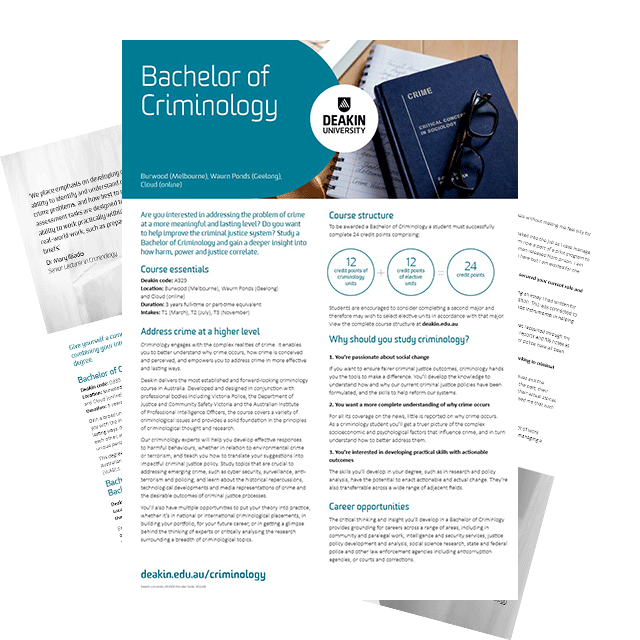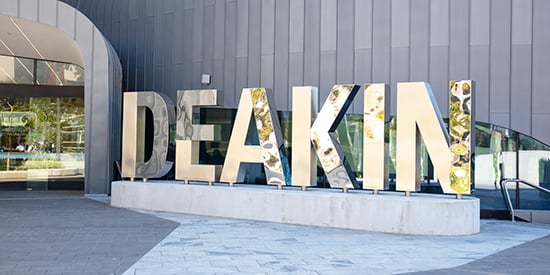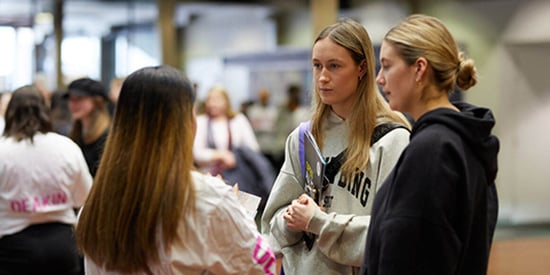Key facts
Key dates
Direct applications to Deakin for Trimester 2 2024 close 23 June 2024
Direct applications to Deakin for Trimester 3 2024 close 27 October 2024
Current Deakin Students
To access your official course details for the year you started your degree, please visit the handbook
Course overview
Deakin’s Bachelor of Criminology/Bachelor of Cyber Security is the only degree of its kind in Australia. It brings together two independent degrees in Criminology and Cyber Security into an attractive four-year combined course. The course will provide you with skills in securing data and data communications, as well as investigating, analysing and providing solutions to computer crime. The course assists you to attain the knowledge required to become a Certified Information Systems Security Professional.
Combining cyber security with criminology covers a wide range of topics concerning the meaning of crime; different forms, causes and consequences of crime; and the different institutions and processes developed for preventing and controlling crime. You will be provided with broad theoretical and applied knowledge and skills in relation to policy development, policing and security, and related fields. Topic areas include crime, justice, security and surveillance.
You should consider this degree if you are interested in pursuing a career in criminology or cyber security, and particularly the many areas where criminology and cyber security overlap (such as in relation to cyber-crime and cyber-security).
You will have the opportunity to complete the Criminology Practicum in your final year of study, a unit that brings the professions to the classroom (including online via the ‘cloud’) with practitioner-driven seminars, activities bridging theory and practice, and the development of an e-portfolio that can be used for employment or career development.
In line with Deakin’s commitment to providing flexible study options, you can choose to study the Bachelor of Criminology/Bachelor of Cyber Security full time or part time, at Waurn Ponds (Geelong) or via Cloud (online) mode. All subjects provide considerable online activities.
You will also have the opportunity to significantly fast-track your studies using Deakin’s trimester system.
Read MoreCourse information
- Award granted
Bachelor of Criminology/Bachelor of Cyber Security
- Year
- 2018 course information
- VTAC code
- 1400310031 - Waurn Ponds (Geelong), Commonwealth Supported Place (HECS)
1400510031 - Burwood (Melbourne), Commonwealth Supported Place (HECS)
1400610031 - Online, Commonwealth Supported Place (HECS) - Deakin code
- D380
- CRICOS code?
- 091788E Burwood (Melbourne), Waurn Ponds (Geelong)
- Level
- Undergraduate
- Approval status
- This course is approved by the University under the Higher Education Standards Framework.
- Australian Qualifications Framework (AQF) recognition
The award conferred upon completion is recognised in the Australian Qualifications Framework at Level 7.
Course structure
Criminology: Students must complete 16 credit points of study from the Faculty of Arts and Education including a minimum 12 credit points of ACR coded units, including the core units of ACR101, ACR102, ACR201, ACR202, ACR301, and ACR302. Students must also complete
Cyber Security: Students must complete 16 core units# of SIT coded units plus the completion of SIT010 Safety Induction Program (0-credit-point compulsory unit).
# Students undertaking D380 are not required to undertake SIT306.
See course entry for Bachelor of Criminology (A329) or Bachelor of Cyber Security (S334)
Students are required to meet the University's academic progress and conduct requirements. Click here for more information.Core units
Criminology core units
Cyber Security core units
Elective units
*ACR210, ACR211 are offered in Trimesters 1 and 3 in alternating years; Trimester 1 2018, 2020, Trimester 3 2019, 2021.
** ACR212, ACR213 are offered in Trimesters 1 and 3 in alternating years; Trimester 3 2018, 2020, Trimester 1 2019, 2021.
^ Note: Students are expected to undertake SIT374 and SIT302 in consecutive trimesters. Students should seek advice from the unit chair if they are unable to complete SIT374 and SIT302 consecutively.
Intakes by location
The availability of a course varies across locations and intakes. This means that a course offered in Trimester 1 may not be offered in the same location for Trimester 2 or 3. Check each intake for up-to-date information on when and where you can commence your studies.
Trimester 1 - March
- Start date: March
- Available at:
- Burwood (Melbourne)
- Waurn Ponds (Geelong)
- Cloud Campus
Trimester 2 - July
- Start date: July
- Available at:
- Burwood (Melbourne)
- Waurn Ponds (Geelong)
- Cloud Campus
Trimester 3 - November
- Start date: November
- Available at:
- Burwood (Melbourne)
- Waurn Ponds (Geelong)
- Cloud Campus
Deakin splits the academic year into three terms, known as trimesters. Most students usually undertake two trimesters each year (March-June, July-November).
Additional course information
Equipment requirements
For information regarding hardware and software requirements, please refer to the School of Information Technology's website, www.deakin.edu.au/information-technology/students or telephone 03 9244 6699.
Course duration - additional information
Course duration may be affected by delays in completing course requirements, such as accessing or completing work placements.
Mandatory student checks
Any unit which contains work integrated learning, a community placement or interaction with the community may require a police check, Working with Children Check or other check.
Participation requirements
Reasonable adjustments to participation and other course requirements will be made for students with a disability. Click here for more information.
Work experience
Elective units may provide the opportunity for Work Integrated Learning experiences.
Need help?
Ask a question about studying at Deakin
Entry requirements
Recognition of prior learning
The University aims to provide students with as much credit as possible for approved prior study or informal learning which exceeds the normal entrance requirements for the course and is within the constraints of the course regulations. Students are required to complete a minimum of one-third of the course at Deakin University, or four credit points, whichever is the greater. In the case of certificates, including graduate certificates, a minimum of two credit points within the course must be completed at Deakin.
You can also refer to the Credit for Prior Learning System which outlines the credit that may be granted towards a Deakin University degree and how to apply for credit.
Students applying with prior study or recognition for prior learning will need to contact the student support office to review their enrolment plans.
Fees and scholarships
Fee information
Learn more about fees.
The tuition fees you pay will depend on the units you choose to study as each unit has its own costs. The 'Estimated tuition fee' is provided as a guide only based on a typical enrolment of students undertaking the first year of this course. The cost will vary depending on the units you choose, your study load, the time it takes to complete your course and any approved Credit for Prior Learning you have.
Each unit you enrol in has a credit point value. The 'Estimated tuition fee' is calculated by adding together 8 credit points of a typical combination of units for that course. Eight credit points is used as it represents a typical full-time enrolment load for a year.
You can find the credit point value of each unit under the Unit Description by searching for the unit in the Handbook.
Learn more about fees and available payment options.
Scholarship options
A Deakin scholarship could help you pay for your course fees, living costs and study materials. If you've got something special to offer Deakin - or maybe you just need a bit of extra support - we've got a scholarship opportunity for you. Search or browse through our scholarships
Apply now
Applications for Trimester 1, 2025 open in August. Each year, thousands of students prepare for uni with the help of Deakin support services. We offer a huge range of support, including one-on-one consultations, webinars, online resources and events throughout the year.
Some of our courses have limited places available - for the latest on courses still open for application, visit Courses by trimester.
Create an account in the Deakin Application Portal, start your application, enter personal details, education experience, upload supporting documents and submit. Need help? Play this video, or contact one of our friendly future student advisers on 1800 693 888 or submit an online enquiry.
Entry pathways
View pathways into the Bachelor of Criminology/Bachelor of Cyber Security with our pathways finder.
Alternative exits
Contact information
Arts and Education Student Services and Enrolment Enquiries
Waurn Ponds (Geelong)
Tel 03 5227 1359
artsed@deakin.edu.au
Burwood (Melbourne)
Tel 03 9246 8100
artsed@deakin.edu.au
Cloud (online)
Tel 03 5227 1359
artsed@deakin.edu.au
Faculty of Science, Engineering and Built Environment
School of Information Technology
Tel 03 9244 6699
sebe@deakin.edu.au
www.deakin.edu.au/information-technology
Careers
Want a degree that’s more than just a qualification? Our industry connections, world-class facilities and practical approach to learning are just some of the reasons why Deakin students graduate confident and ready to thrive in the jobs of tomorrow.
Career outcomes
Promising career opportunities await in the areas of both criminology and cyber security. Graduates may find employment in areas such as government agencies, state and federal police, security and intelligence agencies, research and policy development, correctional services, community services, and private security and consultative industries, as well as more technical roles such as security analyst, security systems manager, security system developer/programmer, anti-virus software developer or computer forensic specialist.
For more information go to DeakinTALENT
Professional recognition
The Bachelor of Cyber Security part of this double-degree is professionally accredited with the Australian Computer Society (ACS).
Course learning outcomes
Deakin's graduate learning outcomes describe the knowledge and capabilities graduates can demonstrate at the completion of their course. These outcomes mean that regardless of the Deakin course you undertake, you can rest assured your degree will teach you the skills and professional attributes that employers value. They'll set you up to learn and work effectively in the future.
Please refer to the Course Learning Outcomes (CLOs) of the single degree.





